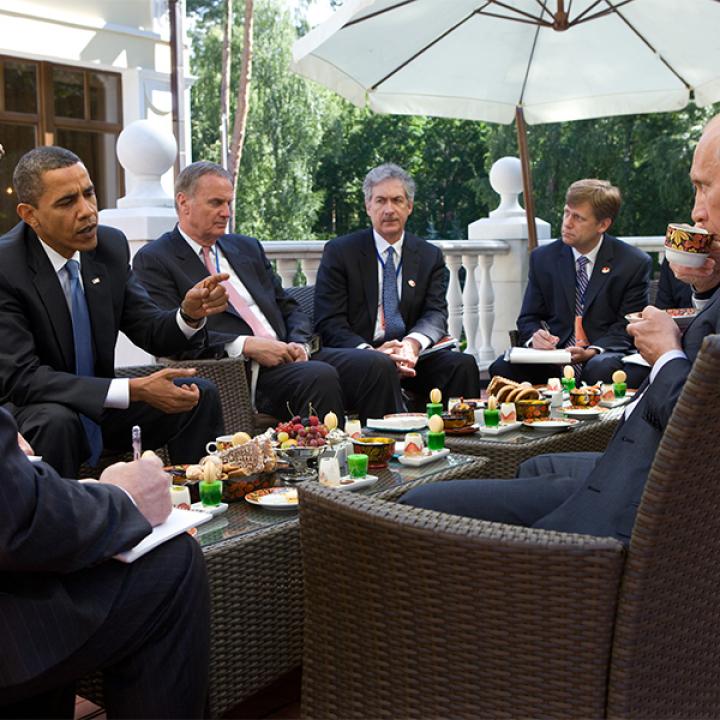
- Policy Analysis
- Articles & Op-Eds
The Smart Power Play That Could Help the U.S. Control Putin

Washington does not need to put boots on the ground to show Moscow, Tehran, and Damascus that is it serious about exercising U.S. power in the region.
Smart power is an important concept -- and one the U.S. should most want to exercise right now. Smart power blends the soft power of cultural and economic appeal with the judicious use of coercion when necessary. In today's world, where information quickly goes viral and economies are interconnected, the exercise of smart power would seem to play to America's strengths.
For smart power to work effectively, others need to see the folly of using hard power. Too bad that Vladimir Putin, Bashar al-Assad, and Ayatollah Ali Khamenei don't seem to have gotten that message. For Mr. Putin, intimidation is the order of the day when it comes to his neighbors with Russian minorities. The threat of invasion hangs in the air. Mr. Putin thinks he is winning and doubts that we or the Europeans are really willing to exact a price.
In Syria, Bashar Assad also thinks he is winning. He has called for elections on June 3 to create an aura of legitimacy for a regime that specializes in killing its people and finding new ways to violate international norms and the rules of warfare. And it seems to be working, with Assad increasingly confident that the tide has turned; he knows that the Russians back him with arms and that the Iranians are all-in in Syria.
For Iran, Syria is about changing the balance of power in the region. The Saudis and others see Syria through the same prism but also see no hesitancy on the part of Russia or Iran to use hard power to affect that balance. They wonder, however, about us. Could we change the perception of our regional friends? And could we change the perception of the Russians and Iranians as well?
Yes, provided we are prepared to show that we are ready to compete in the region and use smart power. By beginning to provide lethal assistance to selected groups in the Syrian opposition, the Obama Administration has already taken one step that sends that signal. Much more is needed, with the objective of trying to change the balance of power on the ground. Russia and Iran need to see that the cost will continue to go up for them in Syria until they are prepared to accept a real political solution.
A second step we could take is to begin to intercept clandestine Iranian arms shipments throughout the region. The Israelis have done it; were the U.S. to do so, it would send a message to the Iranians that just as they can negotiate on nuclear arms while trying to expand their presence and leverage throughout the region, we can also talk and counter their efforts at the same time.
A third step could be an offer to the Saudis and Emirates to begin contingency planning discussions. Such an offer would send an interesting message about our seriousness to use force with our friends if needed.
None of these steps means putting boots on the ground. All of them would signal that we are ready to raise the costs to the Russians and the Iranians for what they are doing -- something that, ironically, probably increases the chances of diplomacy working with both. Mr. Putin, in particular, operates where the risks seem low; showing that we will compete more in the Middle East may affect his calculus on how far and how fast he wants to test our warnings over Ukraine.
One thing to keep in mind about smart power: In the end, it works far more effectively when backed by hard power.
Dennis Ross is the William Davidson Distinguished Fellow at The Washington Institute.
Wall Street Journal

